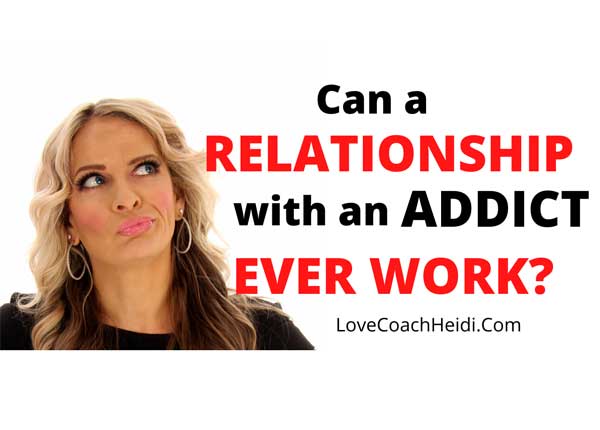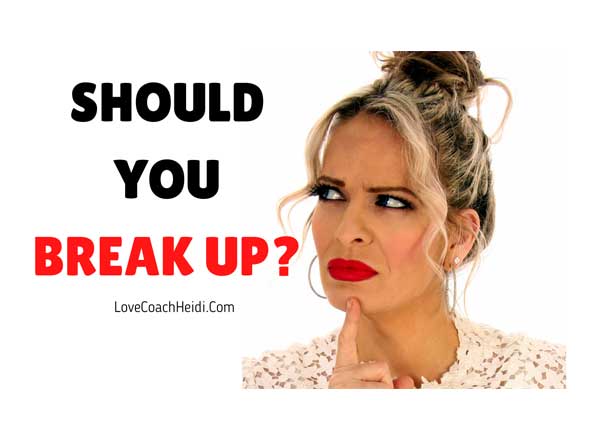When you’re confused about your relationship, it can paralyze you, making it hard to focus on just about anything else.
It’s all you can think about.
You wonder, “Should I stay or should I go?”
“How do I know when it’s over?”
“Should I break up?”
I understand. As a relationship coach, I’ve helped hundreds of people be able to answer this question with absolute clarity.
I want to help you get some clarity with an acronym I use with my clients called. BREAK UP. And I’m going to share it with you now!
And if you can identify with a few of these issues, then I believe it’s in your best interest to consider getting support at www.LoveCoachHeidi.com)
Now, onto the list of red flags that alert you things need to change.
Be yourself. As in, you can’t.
You find yourself trying to morph into whoever you need to be in order to get your partner to approve of you. You find yourself wondering how to be more attractive to win their affection or attention. You sometimes worry about saying or doing the wrong thing to turn your partner off. So, you bite your tongue and are reticent to share your thoughts, opinions, perspectives, feelings or beliefs when you believe they differ from your partner.
This also includes having a judgmental partner who attempts to convince, persuade or control you into being who they want you to be versus who you are. And if you feel like you have to compartmentalize or hide the things about yourself that are less attractive, then you are not being yourself and this relationship is not authentic.
If you are not yourself, where is the trust?
You need to be free to be all of you.
Just a side note, this does not include addiction. If you engage in self destructive, compulsive, or dysfunctional unhealthy behaviors, you cannot expect someone to accept those things and pretend it’s just the way you are. When you are under the influence of anything, you are NOT yourself. And your does not have the real YOU.
If you’re in a relationship with an addict or alcoholic, you do not have to accept that as your partner’s true self. You can encourage them to seek help and get into some type of treatment. Please see my other videos for more support in this area.
R is for Ruminating and RESENTMENTS
Maybe they cheated.
And studies show that it is extremely hard to get over that. So many things are affected.
Trust becomes the biggest issue. You find that you want to trust the other person, but your head keeps going to dark places wondering if it’s only a matter of time before you find out it’s happening again.
And your Self esteem takes a big hit. You wonder what was wrong with you. It can be hard to come back from such a blow to your confidence.
Here’s the truth, many couples do recover from cheating. But the thing is, they get to WORK. Both parties come into coaching willing to see what they need to see, own their parts and commit to a better relationship.
But if you have a partner who is still shirking responsibility, downplaying what happened or flat out lying, then it’s time to go!
How can anything get better of your partner minimizes, denies, or deflects the facts?
If you find that you are ruminating on the past, haunted by what happened and your partner HAS done the work with you, then I also believe this can be worked on.
I’ve seen many people be able to trust again but not be able to move past the hurt.
This is a signal that it’s not just about your partner cheating, but it’s about something deeper. If you get into therapeutic coaching, you can get to the root and restore your happiness.
E is for Earning your keep or proving your value.
Are you scrambling for positioning in your relationship? Do you feel like you need to do more to get them to choose or commit to you?
I used to read books about how to catch a man and then get him to commit to you.
I used to research things like “how to make him obsessed with you.” Or “How to get him to fall in love with you again.”
I’d work on my feminine energy and try to be more attractive.
I know men do this too! You read about how to flirt and find out is she likes you.
If you’re spending energy trying to get him or her to be more attracted to you, you’re in trouble.
Here’s the truth. YOU ARE LOVABLE.
And the right person for you is going to crawl through cut glass to want to be with you. You will not have to google whether or not they are into you. You will not have to strategize, manipulate, or morph in order for them to love you. Period.
I believe there is a MUCH bigger issue here. And that is why you choose emotionally, physically, financially, or psychologically unavailable people.
If we can get to the root of that, you will unleash your most irresistible self.
A is for ABANDONMENT
Has your partner ghosted you? Does he or she disappear from time to time leaving you wondering what you did wrong?
Do they stop texting you back? Or do they stop answering your calls?
THIS IS NOT OK if you are IN a relationship.
Do you remember the Mars and Venus books?
There was a theory in that book about men pulling away from women by disappearing. And that book attempted to normalize behavior by relating to a developmental stage in a relationship.
The theory was that men were like band aids and if you let them pull away from you without chasing after him, he’s snap back to you with full force.
Women are the same BTW, because we are all human.
And all you’ve done when you don’t chase someone who pulls away from you is trigger their insecurity and rejection and they wonder why you’re not upset.
So do they really miss you and want to be with you or are they wondering why you aren’t upset that they don’t want you?
Again, here’s the truth. While it may be true that there comes a point in the relationship where we aren’t sure of wee want to be together, it isn’t usually when we’re dating. It usually comes after some challenges or after the love drugs wear off.
So, if it’s happening early on, take that as a pretty good indicator that the relationship isn’t for you.
When people tell you how they feel, believe them. Don’t try and wait for them to change their mind.
K is for Keep hoping they’ll change.
I know this is going to sound weird coming from a life coach. But people don’t change that much. What they do is become more of who they are.
And the key factor in someone being able to change is the question of nature versus nurture.
You have to know if this is how someone is or how they think they need to be.
I had a client who was running a self destructive pattern in her relationship. Meaning, she would vacillate between being a clinger and a withholder. (You can learn more about these patters on the home page). She’d go all in way too soon. Then she would go cold and withhold from her partner as a way to maintain control. This was NURTURE. She got a mixed message early on about how to do love. She was playing games.
Games are learned. So, when we started working together, we uncovered her true nature, which is to love and give. We decided the withholding happened when she was being triggered and we worked on choosing partners who don’t trigger that behavior.
In another case, a client came to me to get her narcissistic boyfriend to care more.
NOT GONNA HAPPEN. (If you want to know why watch some of my videos on this personality.)
Here’s a great questions for you to ask yourself. “If nothing were to change and they were to stay the same, would you still want to be with them?”
And if the answer is no, decide what you’re unavailable for in a partner moving forward.
If you love an addict, but your relationship is contingent on them being sober, you’ll have some tough decisions to make when they relapse. I know that’s grim. But that is a highly likely scenario.
U is for UMTIMATUMS.
Ultimatums are different than boundaries. I made a video about that too.
If you find you’re always giving ultimatums, that’s a huge red flag.
You deserve someone who’s willing to hear your desires and attempt to meet your needs without you having to threaten the relationship.
If you find yourself saying, “You need to do this or we need to break up.” It’s best to break up. Because I have a very strong feeling you will be giving ultimatums throughout the course of your relationship, not just in this isolated incident.
P is for putting up with less than you deserve.
Is anyone perfect? No. Am I talking about leaving a relationship because someone isn’t perfect for you? No. No one is perfect for you because no one is perfect.
Here’s the difference.
Are you sad most of the time? Are you angry a lot? Do you live with resentment, anxiety, or confusion on a regular basis in this relationship?
Is it abusive in any way? (if so reach out to the www.hotline.org )
If you’re feeling these feelings on a regular basis, it’s time to take a break and figure things out.
Consider allowing me to come along side of you.
Life is too long to continue to settle for less than you deserve.
I know there are a lot of fears.
What if this is as good as it gets?
What of no one else wants me?
What if I’m making a mistake?
What if they change and the next person gets the payoff?
I hear you! But what if they never change and you stay miserable?
How much longer are you willing to continue to settle?
Maybe it’s time to break up.
If you want help drilling down on your specific relationship challenge, reach out to me and let’s schedule a session
XO
Heidi



Recent Comments